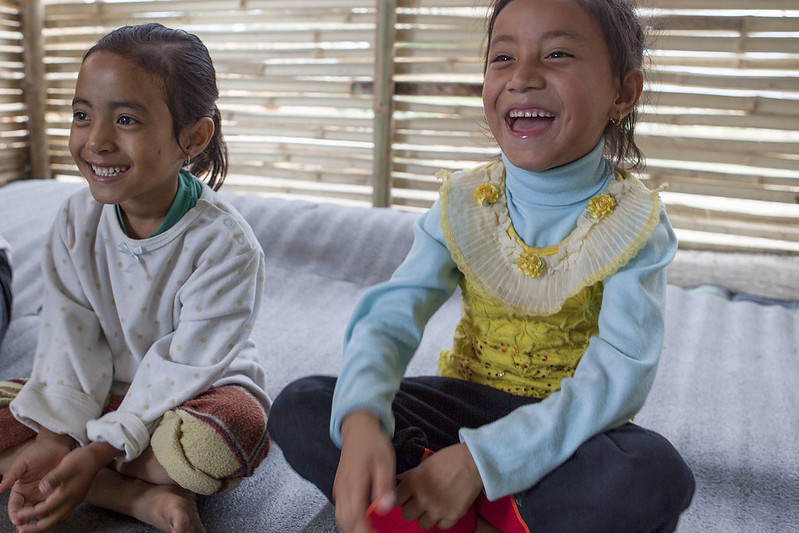
Image: Kashish Das Shrestha/USAID
GREETINGS from the TASK FORCE SECRETARIAT
Dear Friends,
We've had a busy quarter and I'm pleased to share with you some highlights of our recent work that cut across the network, including takeaways from the Child Survival Action side event of the 75th World Health Assembly, a discussion on climate change and child health, and the iCCM subgroup hosted roundtable. We also feature a Reimagining Technical Assistance brief presenting the critical shifts; two case studies shared in the Multi-sectoral Approaches to Health discussion series; and of course, updates from all our subgroups.
We look forward to your continued engagement and hope you will join our upcoming events.
Sincerely,
Dyness Kasungami, Director of the Child Health Task Force
CHILD SURVIVAL ACTION: Roundtable discussion for accelerated progress towards 2030
On May 23rd, linked to the 75th World Health Assembly, the Minister of Health of Sierra Leone, H.E. Dr. Austin Demby and the Minister of Health of the United Republic of Tanzania, H.E. Ummy Mwalimu, co-hosted a roundtable discussion in collaboration with the Child Health Task Force, Global Financing Facility, PMNCH, Save the Children, UNICEF, USAID, and WHO. Moderated by Minister of State to the President of Senegal, Dr. Awa Marie Coll Seck, the side event sought to secure renewed commitments for investment and action for child survival. Participants included the ministers of health from Chad, Madagascar, Mozambique, Nigeria, and Somalia, as well as global health and development leaders.
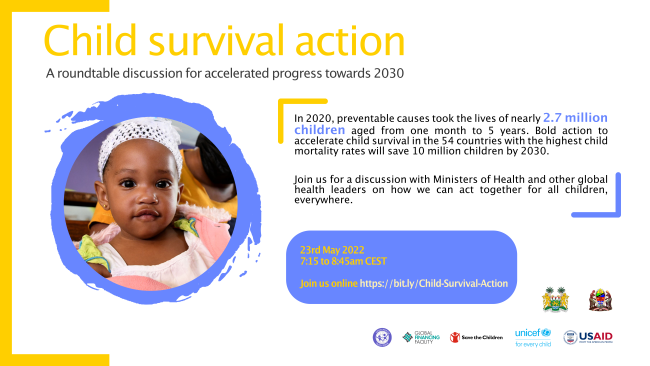
There is immediate need for urgent evidence-based action in the 54 targeted countries to tackle the unfinished agenda of child survival, to rally governments and partners for more effective coordination and implementation of policies and investments, both human and financial. Only when children first survive will they be able to thrive and reach their full human potential.
Key Takeaways:
- Inequities are pronounced not only across countries, but often within countries and are further being exacerbated by conflict, climate change, food insecurity, and COVID-19.
- While there is no one-size-fits-all approach, there are many evidence-based and affordable health care interventions, including immunizations, better nutrition, quality diagnosis, and treatment, that have proven to benefit children. However, there is a knowledge-to-policy gap and fragmentation in implementation.
- There is a need for:
- Effective multi-sectoral responses that align with national strategies and plans and bring multi-stakeholders from WASH, nutrition, protection, and health (including immunization, antenatal care, family planning and communicable disease surveillance) together.
- People-centered and quality primary health care in facilities and communities that is able to provide fair remuneration, training, and skills-building for the community health workforce.
- An equity-sensitive approach that combines not only domestic financing, external pooled investments, and innovative approaches, but also a commitment to making better use of existing resources.
- Community engagement in the design and implementation of multi-sectoral responses.
- Continuous utilization of country system data to focus on vulnerable children and ensure accountability at all levels for change.
- Identifying communities with high proportions of zero-dose children for immunization is a promising approach that can be used to motivate a multi-sectoral response with primary health care as a key anchor.
To read more about the event and access the recording, all materials are posted on the Task Force website. You can also access the recording of the Task Force members' meeting that shared progress on the initiative.
CLIMATE CHANGE DISCUSSION
On May 4th, the Task Force hosted a panel discussion on how to accelerate action for children at risk of dying from climate-related health conditions. The panel brought together representatives from WHO, National Institutes of Health, Ministry of Health Madagascar, and USAID-funded Building Healthy Cities’ (BHC) India team. Presenters provided global evidence and framing of the problem and shared lessons on ways to mitigate and address the issue from project implementation and government perspectives.
Participants had the opportunity to discuss different topics in breakout rooms and suggest actions to address them under the Task Force. Topics included 1) climate-related risk factors for the major killers of children under-five; 2) climate risks for children in humanitarian settings and emergencies; 3) climate-related malnutrition and food insecurity; and 4) equity and human rights for children facing climate risks.
The discussion generated the following next steps:
- BHC will share their multi-sectoral action plan with the Task Force when published.
- The Secretariat will work with Children’s HeartLink and USAID interest group on a future session focused on heat exposure and birth defects in newborns.
- UNICEF will connect the Task Force Secretariat with the UN Committee on the Rights of the Child for future collaborations.
- NIH will work with the Task Force on a session around leveraging mechanisms for funding for climate-related child health projects.
- The Task Force will consider developing a one-pager with members that shares evidence on climate and child health.
The event materials, including the recording and presentation slides, can be found here on the website.
REIMAGINING TECHNICAL ASSISTANCE BRIEF
The Task Force is pleased to share our latest published brief, Reimagining Technical Assistance: Critical shifts to enable strengthened capacity & better health outcomes. Drawing from the previous phased work in the Gates-funded and JSI-led Re-imagining Technical Assistance for Maternal, Newborn, and Child Health and Health Systems Strengthening project, the brief outlines a set of critical shifts needed for a reimagined approach to TA. The shifts aim to enable the capacity strengthening of country institutions to lead their health agenda and deliver better health outcomes. The nine critical shifts are grouped to address:
- Shifting 🠞 how we set the agenda, fund, and partner with countries (#1-3)
- Shifting 🠞 how we plan for, design, and implement programs (#4-7)
- Shifting 🠞 how we address inequity and manage power asymmetries (#8-9)
Read and download the brief on our website.
REIMAGINING THE PACKAGE OF CARE CASE STUDIES
The Task Force recently conducted two case studies from Africa and Latin America, seeking to highlight and understand the facilitators and hindrances to multi-sectoral programs for children. On June 8th, we shared the findings as part of the Re-imagining the Package of Care for Children subgroup's discussion series, Multi-sectoral Approaches to Child Health. The ongoing series provides an opportunity to learn about and collect case studies on effective multi-sectoral approaches. Below are snapshots of each study. You can access the full recording and presentation on the Task Force website.
Case Study #1: Tiwalere II project, Malawi
A five-year multi-sector project, funded by the USAID and implemented in 11 districts across Malawi by Feed the Children along with consortium partners, World Relief and Total Landcare, and private sector partners, NuSkin and Proctor and Gamble. The study conducted nine qualitative semi-structured interviews, which included 10 key program stakeholders. Key informants’ interviews were held with representatives from USAID, Feed the Children, NuSkin, World Relief, and ministry of health officials.Case Study #2: The McGovern-Dole International Food for Education and Child Nutrition Program (MGD), Honduras
Implemented by CRS Honduras and funded by USDA, the school feeding project focused on the strategic objective to improve the literacy of school-age children in 17 municipalities in the Department of Intibucá. The program focuses on education, nutrition, and economic empowerment. The study conducted nine qualitative, semi-structured interviews, which included 13 key program stakeholders. Key informants included representatives from USDA,CRS, COCEPRADI, regional department of education, and external program evaluators from Boston School of Social Work.
We encourage you to join the last two sessions in the series! Subgroup members will present 1-2 additional case studies and define what is needed to support implementation around multi-sectoral action moving forward. Register to join the next session.
iCCM CROSS-COUNTRY ROUNDTABLE OF EXPERIENCES
On May 11, the Institutionalizing iCCM subgroup organized the Cross-Country Roundtable of Experiences in iCCM Gap Analysis and Investment Cases with Ministry of Health, Child Health representatives from Malawi, Kenya, and Uganda and participants from USAID, GFF, UNICEF, and global and local implementing partners, including Save the Children, World Relief Malawi, MCGL, and the Task Force Secretariat. The goal of the meeting was to bring together global and country-level stakeholders from an initial, targeted set of countries to learn from recent country experiences of using the various tools and approaches to mobilize resources for iCCM and community health. Planning is in process for further discussions to support future resource mobilization efforts for iCCM and community health. Below are some of the insights gleaned:
Utility of Tools:
- The UNICEF/MSH Community Health Planning and Costing Tool (CHPCT 2.0) and the process of conducting the costing analysis and developing the investment case allowed for a detailed analysis of iCCM program data. Data are effective in detailed planning and costing for community health programs in general. The application of the tool built the capacity and skills for costing iCCM and community health programs.
- Challenges with data accessibility, availability, and quality across the public and private sectors reinforced the overall need to strengthen the health system alongside the iCCM program and for sufficient investment to enhance HMIS in addition to service delivery, particularly at community level.
- There was a heavy reliance on consultants to use the tool and conduct the process. Participants noted a need to provide technical assistance for capacity strengthening to key stakeholders in the costing, planning, and budgeting process, including the use of the costing tool.
- Participants also noted the need to ensure the tool is clearly understood by local stakeholders and has the full buy-in from MOH leadership and decision makers at subnational levels, as well as the private sector and CSOs.
Use of Investment Cases:
- Plan for iCCM within a wider community health strategy to ensure that support systems exist for implementation.
- Use the investment case to inform concept notes for funding opportunities such as GFF and Global Fund. To increase use, disaggregated costs and sub-national analysis are helpful.
- The tool and investment case needs to go beyond costs and show other economic benefits (and opportunity costs) and how investment in iCCM and community can benefit the entire health system.
SUBGROUP UPDATES
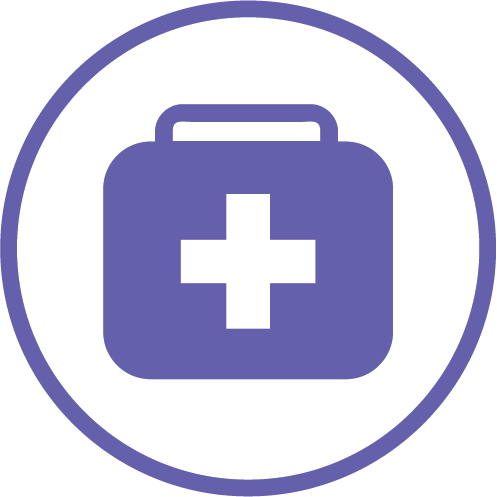
Child Health in Emergencies and Humanitarian Settings
The subgroup welcomed two new co-chairs, Valentina Buj from UNICEF and Mushtaq Khan from the International Rescue Committee.

Digital Health and Innovations
The co-chairs surveyed subgroup members on the priority topics they wish to address this year. The 27 responses indicated the top two areas of interest are using digital tools to improve quality of care and child health research. The subgroup will collaborate with the Implementation Science and QoC subgroups on these workstreams.
Co-chair Darlene Irby moved from JHPIEGO to Pathfinder as Executive Director of Digital Health.
 Implementation Science
Implementation Science
The subgroup has collected detailed information on 16 child health implementation studies across six technical areas and 10 countries. The findings will be used to inform a discussion series highlighting current research in child health.
The co-chairs are planning a training module for subgroup members on manuscript writing and publishing as well as grant writing. These are capacity building opportunities requested by Task Force members in the last members’ survey.
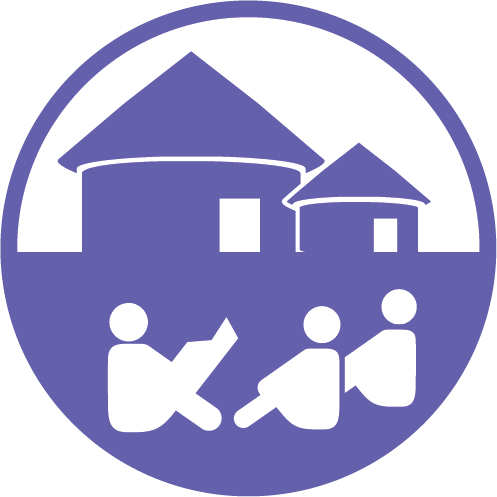
Institutionalizing iCCM
The subgroup co-hosted a webinar with the Nutrition subgroup to share findings from a MOMENTUM Country and Global Leadership report on integrating community management of acute malnutrition (CMAM) into iCCM on February 8th. The recording and presentation are available on the website.
The subgroup hosted a cross-country virtual roundtable on May 11th (see above section for key takeaways). The subgroup plans to share the experience and lessons learned through webinar in the next quarter.

Monitoring & Evaluation
The subgroup is planning a panel discussion with the private sector engagement subgroup for private sector actors and MOHs in Ethiopia and Ghana to share experiences with the use and reporting of HMIS data.
The co-chairs have begun planning to develop a results framework for Child Survival Action along with key child health monitoring partners such as CHAT, Countdown to 2030, etc.
![]() Newborn and Child Health Commodities
Newborn and Child Health Commodities
The subgroup began collaborations with the ORS/Zinc Co-pack Alliance (ORSZCA).
The commodities subgroup held a series of consultative meetings on improving the uptake of amoxicillin and gentamicin for children and newborns. Members contributed evidence for three bottlenecks. The recordings and presentations are available on the website.
The subgroup plans to host a webinar on the newly launched RMNCH forecasting guide on June 28th.
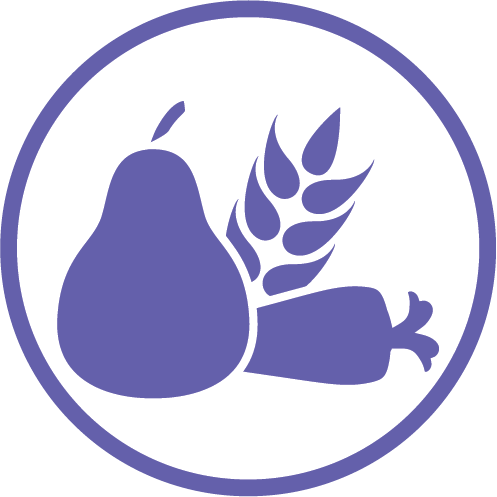
Nutrition and Child Health
The subgroup co-hosted a webinar with the iCCM subgroup (see above for details).
Oscar Cordon from Action Against Hunger became the new co-chair.
The subgroup surveyed its members on ongoing activities and interest in different workstreams, which will be uses to set priorities for future activities.
The subgroup plans to host a webinar on June 27th on ALIMA’s Small-Quantity Lipid-Based Nutrient Supplements (SQ-LNS) Program.
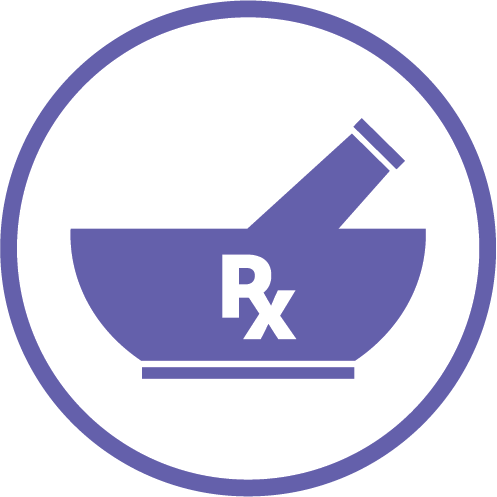
Private Sector Engagement
Amit Bhanot from USAID Frontier Health Markets and Joseph Addo-Yobo from Total Family Health Organisation in Ghana have become the new co-chairs.
The subgroup is planning a panel discussion with the M&E subgroup (see above).
The subgroup is also planning to host a session on current private health provider service delivery models and effective private provider engagement strategies for maternal and child health in Tanzania.
![]()
Quality of Care
The subgroup continued its collaboration with the QoC Network and co-hosted a bilingual webinar on improving quality of nutrition MNCH services. The webinar included a discussion of the MOMENTUM Country and Global Leadership technical brief on applying WHO standards for improving quality of facility-based care to MNCH nutrition services, as well as lessons from Ethiopia’s experience of quality improvement for nutrition. The recording and presentation are available on the website.
Co-hosted a respectful caregiving for newborns and children webinar with the QoC Network, which featured researchers from a study in Kenya, Kenya MOH, and White Ribbon Alliance. The recording and presentation are available on the website.
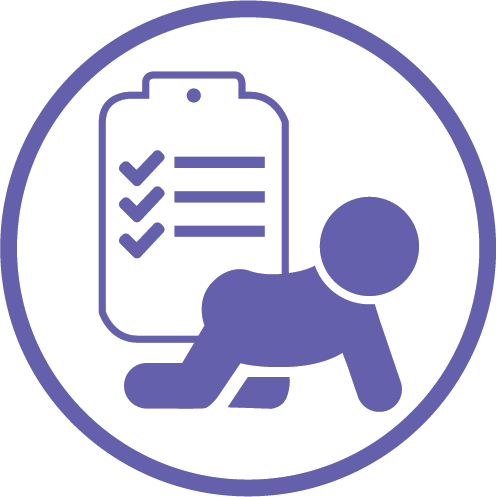
Re-imagining the Package of Care for Children
The subgroup hosted two sessions in a four-part series on multi-sectoral approaches to child health on May 5 and June 8th. The first session shared findings from a literature review of promising approaches to multi-sector collaboration and the second session shared findings from two case studies. The co-chairs are calling on members to share their case studies at the next session on June 29th. The recordings and presentations are available on the website.
Join individual subgroup mailing lists by completing this brief online form.

UPCOMING EVENTS
Task Force Events:
- June 27, 2022, 9:00am EDT [GMT-4] | Addressing Malnutrition in At-risk Children: ALIMA's Experience with Routine SQ-LNS in Niger | Join the Nutrition subgroup for a webinar to learn from ALIMA's experience implementing a lifesaving intervention for at-risk, malnourished children.
- June 28, 2022, 8:00am EDT | RMNCH forecasting tool | Join the Newborn and Child Health Commodities Subgroup for a webinar sharing the new RMNCH forecasting tool.
- June 29, 2022 and August 3, 2022, 10:00am EDT | Multi-sectoral Approaches to Child Health | Join the Re-imagining the Package of Care for Children subgroup for their third and fourth sessions in the series.
Partner Events:
- June 21, 2022, 1:30-3:30pm central European Time | COVID-19 Case Management Webinar Series: Care of the critical patient | Hosted by WHO, this session will bring together global clinical experts to discuss the clinical management of critical patients, the recognition of ARDs, use of non-invasive ventilation, optimized supportive care, prevention of complications and patient centered care. Live translation available.
- June 21-23, 2022, 10:00am GMT | African Regional Convening to Support Parents and Caregivers | The Global Initiative to Support Parents will convene six regional conferences to develop a common understanding of evidence-based solutions and further commitment towards supporting parents and families. The regional convenings will culminate into a Global Summit, at the end of 2022, as well as a compendium of evidence-based case studies.
- June 30, 2022, 11:00am EDT | Community Engagement to Improve Immunization | This edition of the 3ie Evidence Dialogues will focus on what we know about increasing routine immunization of children in low- and middle-income countries through community engagement. The session will include a brief presentation of findings, including qualitative and cost-effectiveness findings, from a new systematic review. A panel discussion will then highlight how policymakers and health sector specialists can translate these approaches into practice as they catalyze action to ensure all children get all the shots they need.

NEWS FROM THE NETWORK
Infographic | School as a Platform to Control Malaria | Commissioned by the Task Force Secretariat, authored by Linda Schultz and Luke Shors, and financed by the USAID Bureau for Africa Office of Sustainable Development, this infographic shares evidence for using schools as a platform for malaria prevention and control. It also identifies key malaria interventions that can be delivered through schools and the respective roles of the education and health sectors. The resource is intended for USAID Mission staff, including health and education officers, as well as implementing partners, ministries of health and education, and school administrators.
- Guidance: Updated WHO Recommendations for Malaria Chemoprevention and Elimination | WHO recently published in their consolidated guidelines for malaria a package of new and updated recommendations across a number of technical areas, encouraging countries to tailor the recommendations to local settings for maximum impact.
- Implementation & Learning Guides: Improving the quality of care for maternal, newborn and child health: implementation guide for national, district and facility levels and Guidance on developing national learning health-care systems to sustain and scale up delivery of quality maternal, newborn and child health care | WHO released two guides focused on supporting the delivery of quality maternal, newborn, and child healthcare.
- Call for Concept Notes: Small Grants to Improve Sexual, Reproductive, Maternal, Newborn, Child, and Adolescents Health (SRMNCAH) | CORE Group will issue small grants to engage with eligible non-governmental organizations and civil society organizations, especially those led by women, adolescents, and people living with disabilities, in a collaborative effort to address key barriers to improving SRMNCAH services and outcomes in Bangladesh, Cambodia, and Nepal.
- Call for Nominations: Open positions on the Advisory Group of the Civil Society Engagement Mechanism for UHC2030 (CSEM) | There are seven open positions on the Advisory Group of the Civil Society Engagement Mechanism for UHC2030 (CSEM). The CSEM Advisory Group fosters civil society representation in UHC2030, links the global and national levels, conveys constituency priorities based on national inputs, and acts as a technical hub.
- Call for Examples of Good Practices: UN Transforming Education Summit | Encouraging all Task Force members to submit country-based examples of school health and nutrition programming that strengthens education to Action Track 1: Inclusive, equitable, safe and healthy schools.
